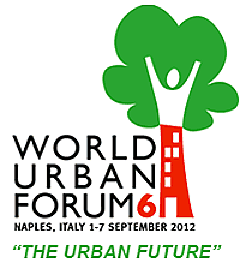UN World Urban Forum - Naples - 1-7 September 2012
THE URBAN FUTURE
 The Sixth session of the biennial World Urban Forum was held in the ancient Italian city of Naples. The theme: THE URBAN FUTURE.
The Sixth session of the biennial World Urban Forum was held in the ancient Italian city of Naples. The theme: THE URBAN FUTURE.
“The World Urban Forum was established by the United Nations to examine one of the most pressing problems facing the world today: rapid urbanization and its impact on communities, cities, economies, policies and climate change.
Since our first meeting in Nairobi, Kenya in 2002, the Forum has grown in size and stature as it travelled to stunning new destinations every two years – Barcelona 2004, Vancouver 2006, Nanjing 2008 and Rio de Janeiro 2010. Today it is by far the world’s premier conference on cities. This is largely because it is one of the most open and inclusive gatherings of its kind on the international stage. It brings together national leaders, slum dwellers, cabinet ministers, womens’ groups, mayors, youth groups,
academics, diplomats, community and business leaders, parliamentarians, local government groups, urban activists, and more; in short, all who share our vision for better, smarter cities of the future.”
The Consortium organized and hosted a series of events:
The Consortium offered sessions at the Forum, with a 'Network Session' brought together presentations which focused on emerging issues related to incremental housing, and a 'Training Session' which addresses design issues targeting practitioners who embark on including incremental approaches. Essentially, one session explored policy and another explored practice.
 |
NETWORK SESSION Objective 1: Provide a forum to build awareness and learn from the successes of built examples drawn from existing international practice. Objective 2: Provide a platform to discuss project issues when embarking on successful incremental, multi-story approaches. Objective 3: Provide a framework and steps for an effective multi-story incremental program, from initial design to beneficiary selection, to supporting incremental expansion. Challenges • Have multi-story examples proven to be successful – do families expand, modify, adjust the original 'core' and improve their housing situation, in terms of quality and quantity. • Is the design flexible and allows many alternative ways to modify and expand. How easy is it for families to expand, modify? Do they use local materials and local skills? • Is it affordable to the lower income? Is a subsidy necessary? What financing/tenure options were available? • What kind of active support was provided? Loans, technical assistance, etc. • What was the original core, and what are some examples of buildouts? (comparative photos would be ideal, but perhaps also plans) • What was the scale of the incremental projects? Experimental or a complete project? • How was public infrastructure handled (water, sanitation, roads, etc.). Was this also incremental? • What is the regulatory environment that was necessary for success? • And in summary, should/could incremental strategies be promoted as a high density affordable housing strategy? |
 |
TRAINING SESSION:
HOW TO DESIGN PROACTIVE INCREMENTAL HOUSING STRATEGIES
TO MEET RAPID URBAN GROWTH CHALLENGES
: 1 – How to design the three critical components for effective incremental strategy: a physical frame to guide growth, a context specific 'starter' option, and supporting policies for rapid consolidation, to guide safe construction, and continued community reinforcement and economic well-being. 2 – How to assess and select viable incremental proposals using a practical set of metrics based on field experience. 3 – How to understand effective support policies using a three-stage model paralleling development stages in the formation of a community. (Click for summary) |
For information on WUF 6:
http://www.unhabitat.org/categories.asp?catid=672

